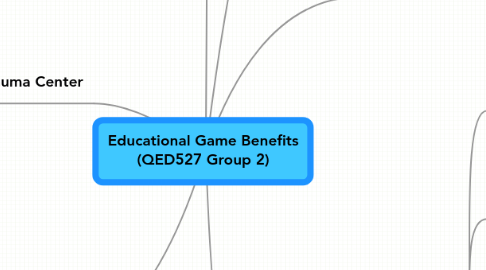
1. McVideo Game
1.1. Psychomotor
1.1.1. Have to think of the manufacturing process and steps needed to produce the raw material for the burger
1.1.2. Must be able to multi-task effectively. Spontaneous response is required.
1.2. Affective
1.2.1. Disappointed if we are not able to keep our farm ongoing.
1.2.2. A sense of success when financial status increase
1.2.3. Gets lost and nervous when things are not going well
1.3. Cognitive
1.3.1. Strategising is required in order to continue the game.
1.3.2. Addictive!!
1.3.3. Always thinking of solutions to solve problems
2. Trauma Center
2.1. Affective
2.1.1. While playing the game, the 'surgeons' unconscienciously show their emotions. For example, when the patient is dying, the 'surgeons' will be panicked and ask for help anxiously. When the bone is fixed wrongly, the 'surgeons' will feel what a waste.
2.1.2. Huge sense of joy and achievement when tasked is done
2.2. Psychomotor
2.2.1. This game will require the use of the control to operate on the patient. Hence, the precision is important (especially assembling the bone and stitching up wounds etc).
2.2.2. The actions have to be fast and accurate so as to save the patient within shortest possible amount of time to have high score.
2.2.2.1. Trains hand-eye co-ordination and the game also involves quick decision making
2.3. Cognitive
2.3.1. The 'surgeons' have to respond to the situation fast so as to save the patient.
2.3.2. The 'surgeons' have to coordinate well with each other in order to save the patient in the shortest amount of time.
2.3.3. Not advisable for young children. Suitable for biology lessons.
3. New node
4. Dafur is Dying
4.1. Cognitive
4.1.1. Think of ways to avoid getting caught.
4.1.2. Have to plan a good strategy to get to the water well and escaping from the persuit of army
4.2. Affective
4.2.1. Players feel excited because they want to win the game without getting caught.
4.2.2. We, as outsiders, are able to learn firsthand regarding the crisis in Darfur, without the need to travel there. So, we will be able to sympathise with them.
4.3. Psychomotor
5. Wii Sports/Fit
5.1. Cognitive
5.1.1. Adopting the best strategy to overcome the odds of the game
5.1.1.1. Try to put yourself in your opponent's shoes
5.2. Affective
5.2.1. The feelings and emotions of the players playing Wii
5.2.1.1. Modes of display
5.2.1.1.1. Facial expressions
5.2.1.1.2. Hand gestures
5.2.1.1.3. Posture
5.2.1.1.4. Voice characteristics
5.3. Psychomotor
5.3.1. The ability to use sensory cues to guide motor activity.
5.3.1.1. Hand-eye coordination
5.3.1.1.1. Movement made has to be accurate as the controller is sensitive.
5.3.2. Stages of Psychomotor Development
5.3.2.1. Stage 1: Cognitive
5.3.2.1.1. As the learner tries to control and manipulate the game, there will be awkward, slow and choppy movements. The learner will think
5.3.2.2. Stage 2: Associative
5.3.2.2.1. The learner spends less time thinking about every detail, however, the movements are still not a permanent part of the brain.
5.3.2.3. Stage 3: Autonomic
5.3.2.3.1. The learner can refine the skill through practice, but no longer needs to think about the movement.
6. Other Flash-based games
6.1. Cognitive
6.1.1. Some of the flash games are mathematical and scientific in nature. Hence, it will require students' information processing skills and maths/science concepts.
6.1.1.1. Maths based games
6.1.1.1.1. Students need to know the concept well.
6.2. Affective
6.2.1. Generally not as animated in expressions of emotions as the Wii games but in time based ones, the asking for help gets more frequent when the problems get increasingly difficult with each level
6.2.2. Generally not as animated in expressions of emotions as the Wii games but in time based ones, the asking for help gets more frequent when the problems get increasingly difficult with each level
6.3. Psychomotor
6.3.1. Not as much hand-eye coordination is needed as it basically involves 'point-and-click'
6.3.2. Word based games require finger movements during the games
6.3.2.1. Their typing skills improve
6.3.2.1.1. New node
6.4. Disadvantages
6.4.1. Working against time- Students may feel stressed out
6.4.2. Compulsion/addiction
6.4.2.1. They have the tendency to play the games at home
6.4.3. Emotionally involved
6.4.3.1. When their friends comment on their low scores, they may get carried away
